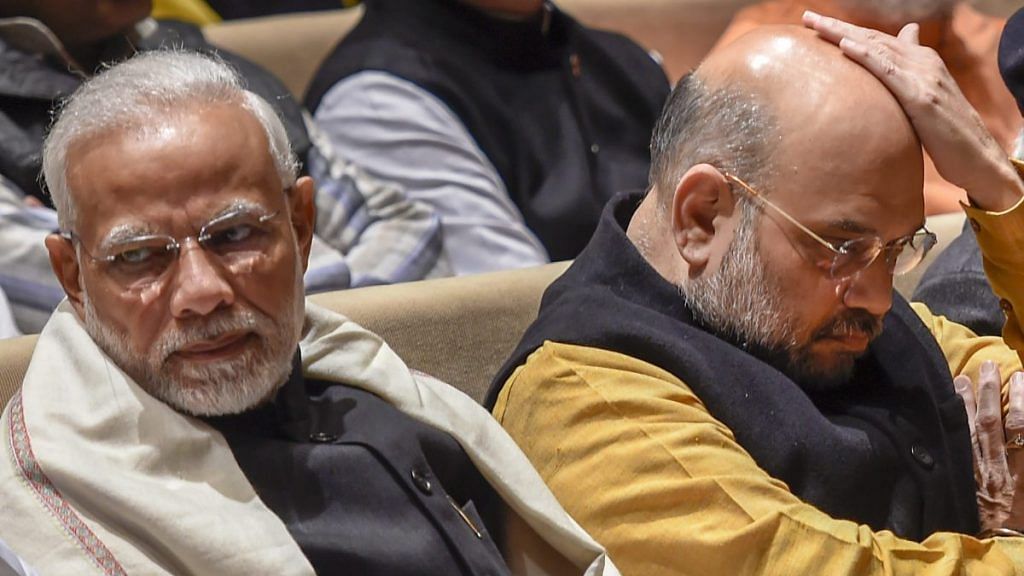The massive nationwide protests against the Citizenship Amendment Act and the National Register of Citizens have revitalised Indian civil society, with broad coalitions springing up between students, minorities, lawyers, Dalits, doctors, academics and the urban youth.
Not since the 1990 Mandal agitation has Indian society seen such an outpouring of people on the streets from Coimbatore to Delhi. If the coalitions hold, there is reason to feel optimistic about the future of India. If they don’t, and the CAA and the NRC are implemented, then India will be split between Hindu India vs Muslim India, northeast vs Hindi belt, north India vs south India and Kashmir vs the rest of India. Kashmir has been neglected in the recent protests and it is important that we don’t forget that it is a crucial part of the Narendra Modi government’s Hindutva agenda.
Also read: Modi wrongly quoted Mahatma Gandhi on Pakistan’s Hindu & Sikh refugees to defend CAA
CAA-NRC ramifications
In the event that the protests are unsuccessful, and Modi and Amit Shah are able to move ahead with their plans for implementing two-tier citizenship, we should be prepared for certain consequences that will alter Indian society and its relationships regionally and internationally forever.
Within India, society will be divided between a triumphal Hindus and a marginalised, resentful minority, which will forever look over its shoulders for the next demand and the next compromise that it will have to make for “acceptance”. Anxiety has already set in Indian Muslims ever since Parliament passed the CAA.
Economically and socially, it is very likely that Muslim youth will look to transnational Muslim causes like Palestine, Syria, Afghanistan as a way to focus on their politics. Pan-Islamist politics, especially the Wahabi kind, has been a very minor current in Indian Muslim political thought so far. That is one reason why homegrown Islamic radicalisation has historically never been an issue for India. With ISIS’ eyes already set on India, the alienation of Muslims might create significant problems in the country.
Second and more importantly, the diversity and complexity of Indian identity — both Hindu and Muslim, which has been regional, linguistic, caste and class-based much more than univocally religious — will be lost to a univocal, religious identity.
The diversity of identities has been a hallmark of our nationalism and defines what it means to be Indian. The Indian national anthem says “Punjab, Sindh, Gujarat, Maratha, Dravid, Utkala, Banga”, not “Hindu, Muslim, Sikh”. When Maulana Azad or Jawaharlal Nehru were imprisoned, it wasn’t for their religious identities, but for their ideas of broad-based nationalism for all Indians.
But those Hindu apologists who take refuge in Samuel Huntington’s “clash of civilizations” theory to justify their radical ideology forget that this theory is now discredited and is just a ridiculed footnote in history.
Many have pointed out that the Citizenship Amendment Act is unconstitutional and goes against Article 14. It won’t be a stretch to say that in the future, laws may be amended to give preferential rights to Hindus.
Politically, the CAA-NRC step would be so out of touch with contemporary global thought that India would lose all claims to regional, international and moral leadership. In addition, Islamic nations, which we have close trade and cultural ties with, are already starting to show their displeasure. The US, with whom India has been building ties based on ‘shared values’ for the last three decades, can’t be counted on indefinitely. US senators have been questioning India’s moves ever since Article 370 was diluted in August.
Intellectually, revisionism will have to be undertaken on a massive scale. We will have to rewrite history to identify leaders and politicians by their religion, thus falsifying it as the primary identity. This process has already begun with attacks on Indian historians (such as Romila Thapar and Ramachandra Guha) and in debates over Veer Savarkar and Nathuram Godse. In this wave of saffronisation, one must remember Hindustani classical music also has a glorious tradition of thumri, khayal, qawwali and naat. Kathak, even bhangra, has echoes of central Asian dances. Will we have to part with these cultural heritages too?
Economically, India risks losing friendly ties and trust. Indian diplomacy is working twice as hard to explain to the world what the NRC and CAA are. Currently, India’s top 15 trading partners include the US at #1, UAE at #2, Bangladesh at #8, Malaysia at #13 and Saudi Arabia at #15. Almost 50 per cent of India’s exports are to fellow Asian countries. The world needs our cheap labour, but most countries will not go against popular opinion at home. Let’s not fool ourselves that economic rationalism will trump self-preservation for leaders like Recep Tayyip Erdogan or Mahathir Mohamad or Mohammed bin Salman.
Also read: All-India NRC will certainly fail. Here’s what Modi govt should do for its citizenship plan
Unintended consequences
And the most important and crucial part is our people. Logistically, how is India going to contain dissenters? No detention centre will hold so many people. Today, we are attacking Muslims, but who will the BJP target next? I am sure all minorities in India are secretly pondering this. Sikhs were already targeted under the Congress’ rule. Now, Muslims are under the gun.
Antonio Gramsci, in his Prison Notebooks, had said that in order to govern, all states need the consent of the governed. However consent can’t be demanded hegemonically, it has to be manufactured through balancing competing claims and through policies that benefit all sections of society. The Modi government seems to have forgotten this crucial piece of arthashastra, so it should be prepared for the laws of unintended consequences.
The author is Professor, International Studies and Refugee and Forced Migration studies, DePaul University. Views are personal.
Also read: This is why Modi will win the war protesters have waged against him on CAA
